Contact Us!
Geriatric Care
Animal Doctor offers comprehensive medical and preventative geriatric care. We accept referrals and provide second opinions.
Description: The term geriatric refers to cats older than 14 years of age, and dogs older than 10 to 12 years of age (depending on their size.. the bigger the dog, the sooner they are considered geriatric). Geriatric care involves biannual physical exams, blood and urine testing, possible x-rays, and other diagnostics or procedures when indicated.
Symptoms & What to look for: Geriatric pets can have a multitude of chronic conditions, including arthritis, decreased eyesight, weight loss or gain, endocrine diseases such as diabetes and hypothyroidism, and loss of urinary or bowel control. There are many possible symptoms seen in geriatric pets, including limping, decreased activity/lethargy, decreased appetite, or dropping food, increased drinking/urination, a change in urine or bowel habits, anxiety, and weight loss or gain.
How does it happen? As pets age, organs can begin to fail, pets can develop arthritis, anxiety, changes in bowel and urinary habits, and endocrine diseases such as diabetes and hypothyroidism.




What questions do we ask?
- Any recent changes in thirst/ urination?
- Any recent history of Coughing or sneezing?
- Any recent history of Vomiting or diarrhea?
- Any limping noted? Any difficulty with stairs or furniture?
- Any recent changes in activity level or behavior at home?
- Any changes in appetite or food apprehension? What type of food are you feeding?
- Which medications is your pet currently taking? Any recent changes? Any difficulty giving the medication?
- Any recent weight loss or gain?
What are the steps we take to treat your pet?
- We acquire a thorough history
- We perform a thorough physical examination
- We collect blood, urine, and occasionally stool samples for testing.
- X-rays or ultrasound may be recommended.
Animal Doctor Geriatric Care potential treatment plans?
Oral medications
- Oral antibiotics when indicated (urinary tract infection, skin infection, dental infection).
- Oral anti-inflammatory medications (NSAIDs, Gabapentin, nutritional or joint supplements.
- Oral anti-anxiety medications.
- Oral appetite enhancers
- Oral medications for endocrine diseases (Thyroid supplements, medications for Cushing’s disease)
- Oral cardiac medications when indicated
Injections
- Anti-inflammatory medications
- Antibiotics
- Anti-nausea medications
- Monthly joint / arthritis pain injections (Adequan, Solensia)
- Vitamin injections
- Daily Insulin if diabetic
Topical Medications/Treatments
- Cold Laser treatments for arthritis pain.
- Subcutaneous fluids for dehydration.
- Dental cleaning / polishing when indicated.
- Surgical mass excisions when indicated.
What are the risks if geriatric care is left unmanaged?
If your geriatric pet is left untreated, this can potentially shorten his/her life, and decrease the quality of life due to chronic pain, infection, anxiety, and decreased bond with the pet owner.










